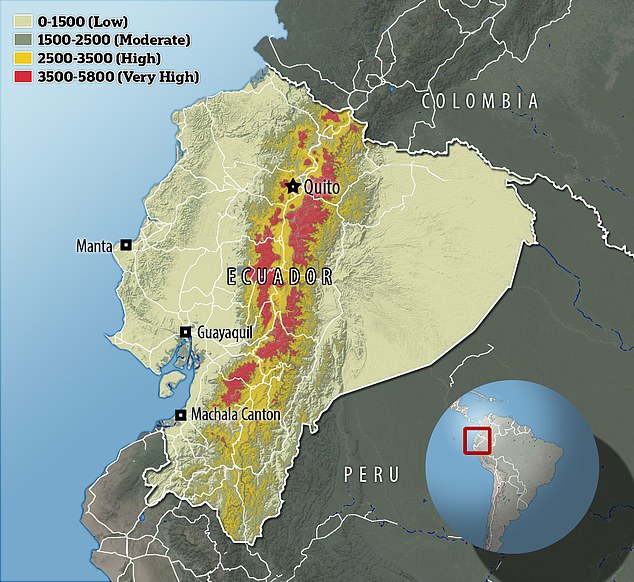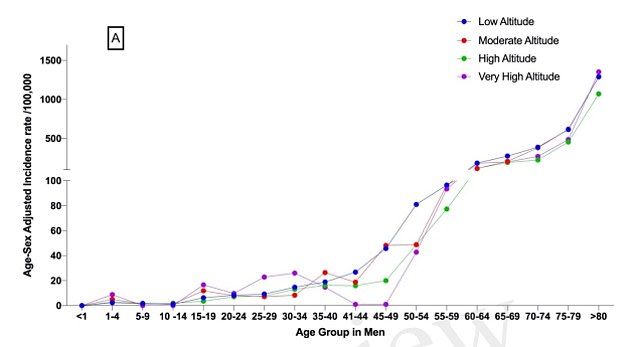Living on a mountain could protect you from a stroke, study claims
- Ecuadorian researchers looked through more than 100,000 stroke cases
- They found those living below 2,500 metres were more at risk from the condition
- But those at higher altitudes were less likely to be hospitalised or die from stroke
Living high up a mountain may protect you from suffering or dying from a stroke, a study suggests.
Ecuadorian researchers looked through more than 100,000 stroke hospitalisations and deaths in the country.
Stroke patients were divided into two groups, based solely on where they lived and its elevation above sea level.
Results showed people living below 2,500m — which includes the entire UK — were more likely to suffer a stroke. And they were also more likely to be hospitalised or die from the condition, one of the most common causes of death.
Academics from Ecuador’s Universidad de las Americas were baffled as to why this may be the case.
But they speculated people living at higher altitudes could have grown extra blood vessels in their brain to counteract the lack of oxygen at high altitudes.
When someone has a stroke part of their brain is starved of this vital chemical, which can lead to cell death.
There are around 32,000 strokes a year in the UK, while there are more than 795,000 annually in the US.

Scientists found Ecuadorians living more than 2,500 metres above sea level (yellow and red ) were less likely to suffer a stroke than those living below this altitude (grey and green )

The scientists found that older men were more likely to suffer strokes than younger men, regardless of which altitudes they lived at
The study, published in the journal Frontiers in Physiology, looked at hospitalisations and deaths in Ecuador between 2000 and 2017.
Men living 2,500m above sea level were 35 per cent less likely to die of a stroke than those at lower altitudes, the researchers said. There was a similar, but not as great, difference for women.
They were also less likely to be hospitalised, the data suggested.
And it found men living at high altitudes developed stroke up to four years later than low altitude dwellers.
However, the results were not statistically significant, suggesting other factors may have been involved for the findings.
An analysis on healthcare availability was also carried out.
It found people living at higher altitudes had more hospital beds available (173 per 100,000 people) compared to those at lower levels (128 per 100,000 people).
About 30 per cent of the country’s 17million people live in the Andes, which go up to more than 6,000 metres above sea level.
Lead author Professor Esteban Ortiz-Prado said: ‘The main motivation of our work was to raise awareness of a problem that is very little explored.
‘More than 160million people live above 2,500 meters and there is little information regarding epidemiological differences in terms of stroke at altitude.
‘We wanted to contribute to knowledge in this population that is often considered to be the same as the population living at sea level, and from a physiological point of view we are very different.’
The highest point in Britain is Ben Nevis, which stands about 1,300 metres above sea level.
Strokes usually happen when a clot forms inside one of the brain’s major vessels, leading to the surrounding tissue being starved of oxygen and dying.
They can also be triggered by a bleed on the brain.
Several factors can increase someone’s risk of suffering from the condition including smoking, obesity and high blood pressure.
Symptoms include a sudden numbness or weakness in the face, trouble speaking or confusion and severe headaches with no known cause.
This study builds on previous research which linked living at high altitudes to being less likely to suffer a stroke.
